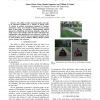6010 search results - page 113 / 1202 » Computational Approaches to Drug Design |
ICAI
2008
13 years 11 months ago
2008
The ability to follow man-made paths and roads is an important capability for a number of robotic tasks. To operate in outdoor environments designed for humans, autonomous robots m...
ICASSP
2010
IEEE
13 years 8 months ago
2010
IEEE
A major limitation of Brain-Computer Interfaces (BCI) is their long calibration time, as much data from the user must be collected in order to tune the BCI for this target user. I...
ACMDIS
2006
ACM
14 years 4 months ago
2006
ACM
Reusing HCI design knowledge shows potential in allowing practitioners to design based on previously identified concerns. A reuse approach is presented that is based on claims, de...
WWW
2007
ACM
14 years 11 months ago
2007
ACM
We describe collaborative efforts between a knowledge representation team, a community of scientists, and scientific information managers in developing knowledge models for ecolog...
SIGCSE
2009
ACM
14 years 5 months ago
2009
ACM
Many courses on the history of computing are designed for a general student audience, and as such, include fewer technical details than one might find in a typical CS course. Whi...


